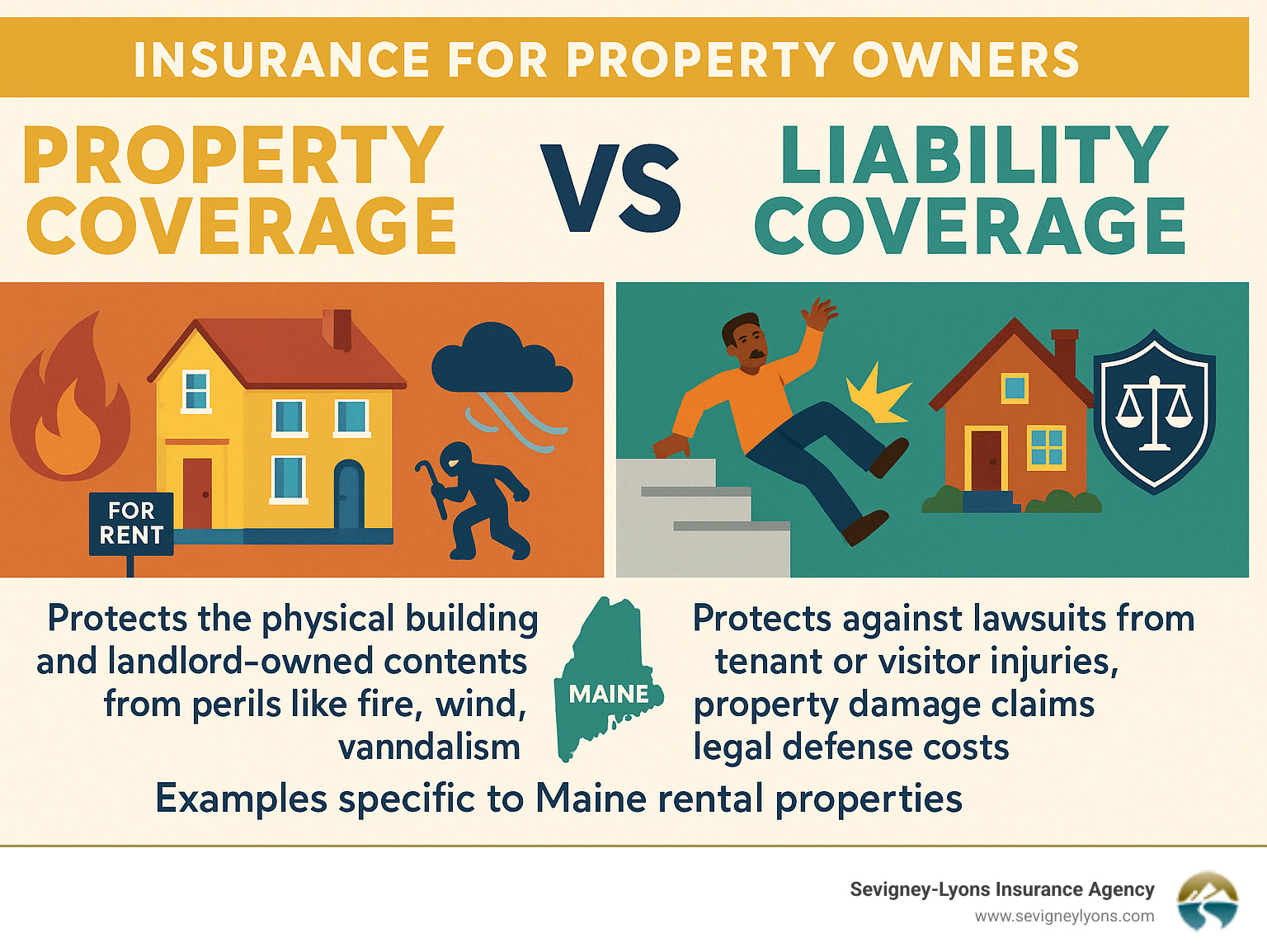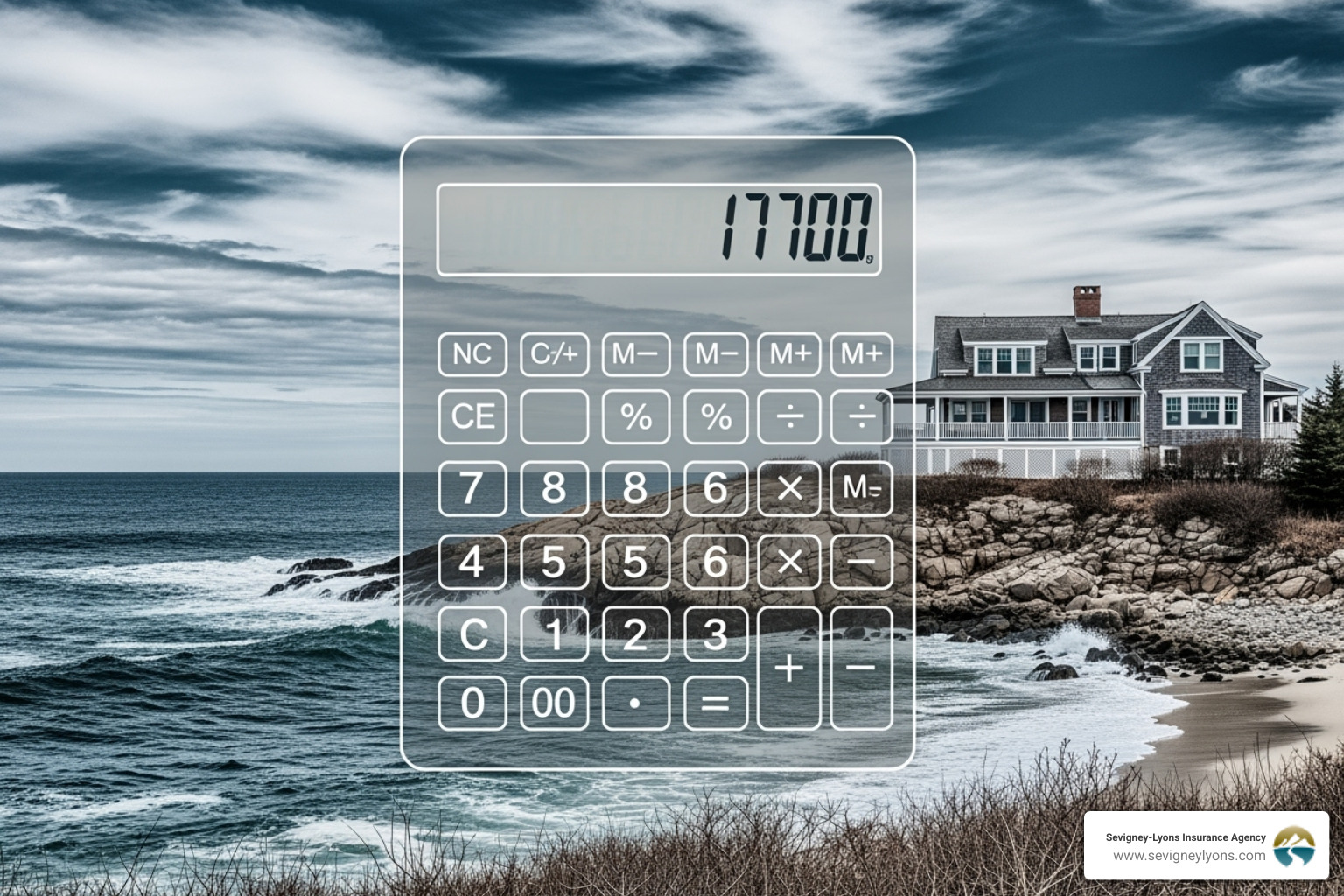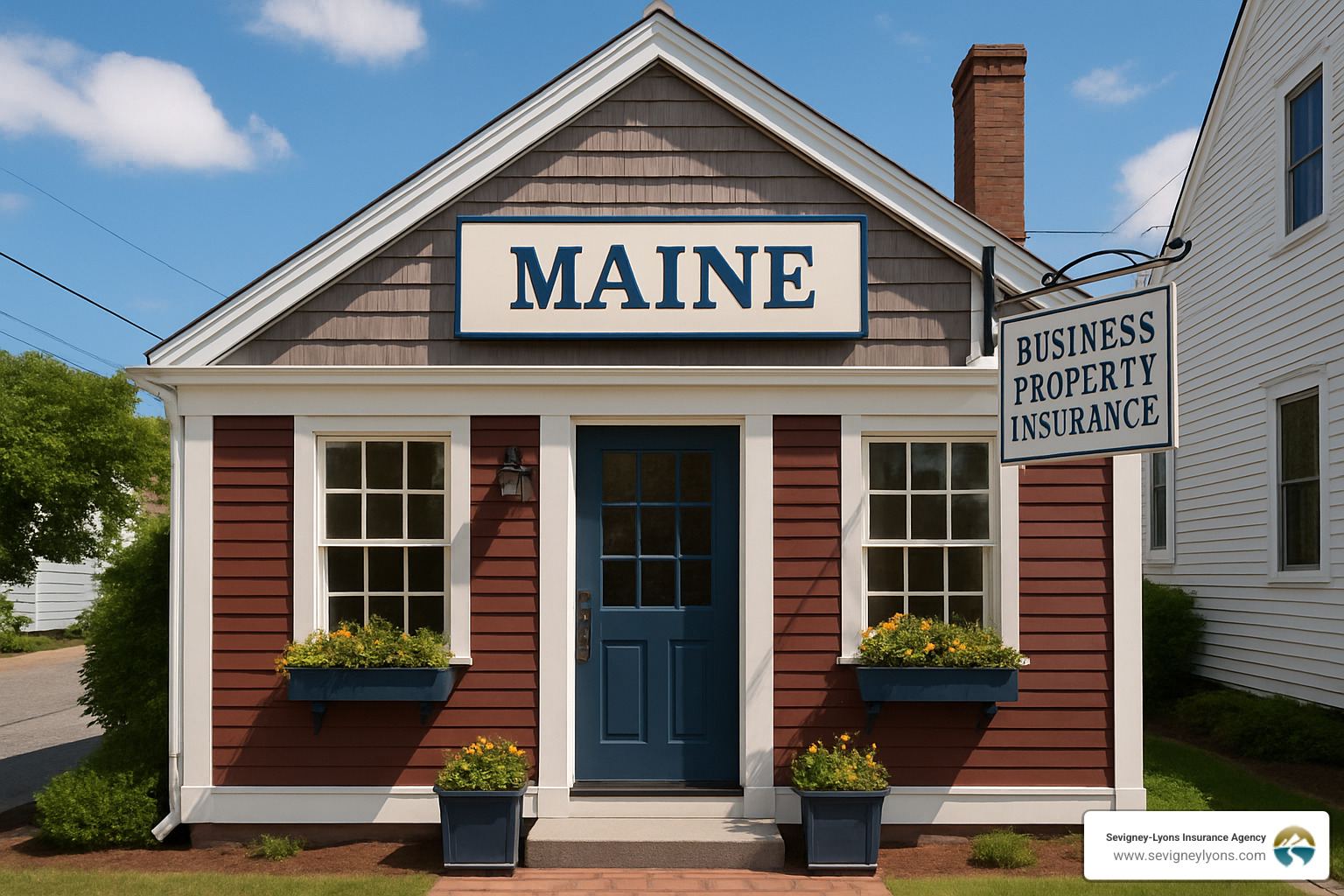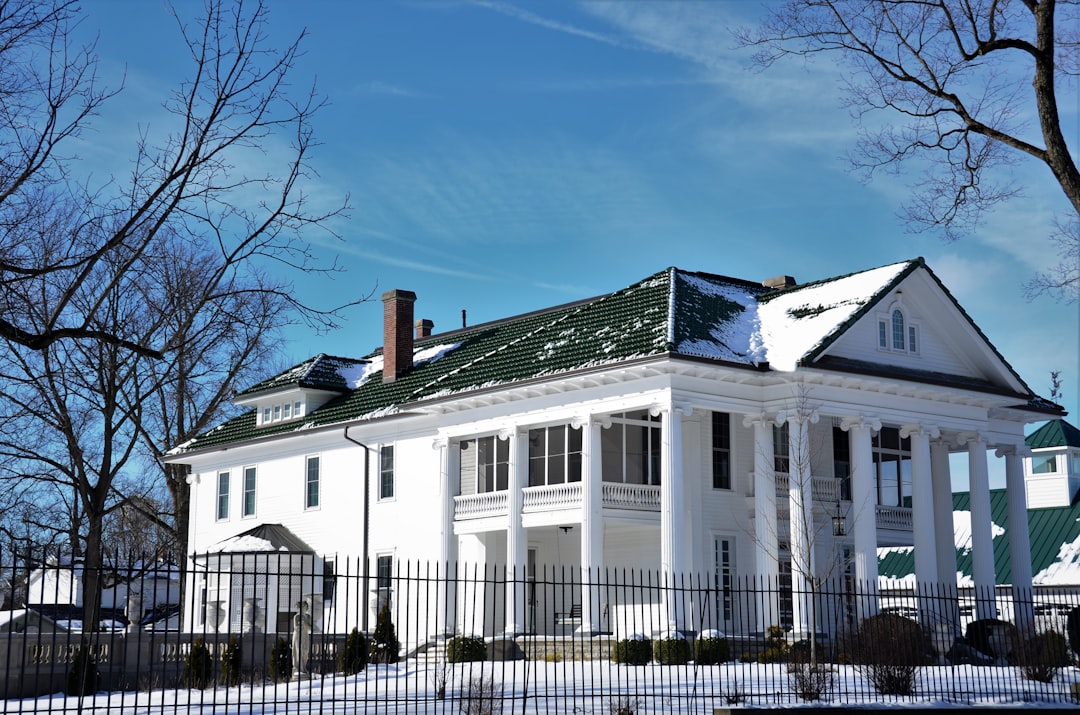Blog Content
Why Property Owners Need Specialized Insurance Coverage
Insurance for property owners comes in different forms depending on your property's use. Understanding these differences can save you thousands in uncovered claims.
Quick Answer for Property Owners:
- Homeowner's Insurance - Covers your primary residence where you live
- Landlord Insurance - Protects rental properties you don't occupy
- Key Differences - Landlord policies cover rental income loss and tenant-related risks
- Maine Considerations - Coastal properties need flood coverage, nor'easters require wind protection
Whether you own a home in Wells you're considering renting or a multi-unit property in Biddeford, the wrong policy can leave you financially exposed.
Many Maine property owners find too late that their standard homeowner's policy doesn't cover rental activities. As one insurance professional noted: "Home insurance is designed for owner-occupied dwellings and typically only covers the property, contents, and personal liability for the homeowner and their dependents."
The risks are real: a tenant's kitchen fire, a slip-and-fall lawsuit, or storm damage can cost tens of thousands. In coastal areas like Kennebunk and Ogunquit, flooding and wind damage add more complexity.
The good news is that choosing the right coverage is straightforward once you understand the basics. This guide will cover what you need to know to protect your Maine property investments.

Insurance for property owners vocabulary:
Differentiating Policies: Homeowner's vs. Landlord Insurance
The biggest mistake Maine property owners make is assuming their homeowner's policy covers a rental property. It's an honest mistake that can be costly.

Here's the fundamental difference: homeowner's insurance protects your primary residence. It covers your personal belongings and liability, assuming you live there.
Landlord insurance is business insurance for your real estate investment. It's designed for properties you own but don't occupy.
The differences are significant. A homeowner's policy covers your personal belongings, while a landlord policy covers items you provide for tenants, like appliances in your Wells rental or a Biddeford duplex.
The liability gap is also crucial. A guest injury at your home is covered by homeowner's insurance. An injury at your rental property requires insurance for property owners with rental activities, which covers business liability.
Understanding the Basics of Insurance for Property Owners
Insurance for rental properties often refers to "Dwelling Fire" policies (DP-1, DP-2, DP-3), with DP-3 being the most comprehensive.
A standard HO-3 homeowner's policy isn't for investment properties because renting is a "business activity," which is typically excluded. A rental-related claim could be denied.
We've seen Maine property owners face claim denials for this reason. A tenant causes water damage in Kennebunk, or someone gets hurt at a rental in Ogunquit, and their homeowner's policy won't pay because it was a business use.
Your rental property is a business asset that needs protection designed for that purpose.
Maine Home Insurance Explained.
When Do You Need to Switch from Homeowner's to Landlord Insurance?
You need to switch to landlord insurance the moment you start collecting rent. The timing can be tricky in certain situations.
Moving out entirely is the clearest case. If you relocate and rent your former home, you need landlord insurance immediately, as your homeowner's policy becomes invalid.
Long-term rentals (30 days or more) require landlord coverage, whether it's a single-family home in Wells or a multi-unit in Biddeford.
Short-term rentals (Airbnb, VRBO) present unique challenges, especially in coastal towns like Kennebunk and Ogunquit. Standard homeowner's and landlord policies often don't cover the specific risks of vacation rentals.
Renting just a room while you live in the house is a gray area. Some homeowner's policies offer endorsements for this, but you should discuss your situation with an agent to ensure proper protection.
Vacant properties may require special coverage if empty for more than 30-60 days (timeframe varies by policy).
The most important step is to always notify your insurance company of any change in your property's use. Failing to report rental activity is the fastest way to a denied claim.
Core Coverage in a Landlord Policy
Let's explore the specific coverages included in a landlord policy, which are key to protecting your investment.

A landlord policy has three crucial parts: property coverage for your physical asset, liability coverage against lawsuits, and loss of rent coverage to maintain your income after a disaster.
When shopping for insurance for property owners, you'll find two main policy types: named perils (covers only listed risks like fire or theft) and all-risk (covers everything unless specifically excluded). Most landlords prefer all-risk for its broader protection.
Understanding your deductibles (your out-of-pocket cost) and policy limits (the maximum payout) is crucial for balancing your budget and protection.
Protecting Your Physical Asset: Property Coverage
Protecting the physical structure of your rental property is a top priority. Property coverage is the foundation of a landlord policy.
Dwelling coverage protects the main structure (walls, roof, etc.) from perils like fire, wind, and hail. For any property, from a Wells Victorian to a Biddeford duplex, robust wind coverage is essential in Maine due to nor'easters.
Coverage for other structures, like a detached garage or shed, is also included. These are common on Maine properties and are just as vulnerable to storm damage.
Your policy covers landlord's personal property used to service the rental, such as appliances or maintenance equipment. It does not cover your tenants' belongings; they need their own renter's insurance.
Landlord policies typically cover vandalism and theft, which are real risks for rental properties.
Maine's weather presents unique challenges. We see frequent claims from wind damage (especially on the coast in Kennebunk and Ogunquit), hail, and water damage from burst pipes in winter. Ice dams are another common and costly issue.
Shielding Yourself from Lawsuits: Liability Coverage
Liability coverage protects your finances from lawsuits, which can be devastating even if you're not at fault. It's a critical part of your policy.
Bodily injury claims are common. If a tenant's guest slips on an icy walkway or is hurt by a loose handrail, your liability coverage handles medical bills, legal defense, and settlements.
Property damage claims apply if you're responsible for damaging another's property, like a burst pipe flooding a neighbor's unit. Without this coverage, you'd pay out-of-pocket.
Even for baseless lawsuits, legal defense costs can be substantial. Your liability coverage typically includes these costs, regardless of fault.
Landlords face unique risks like claims of wrongful eviction, wrongful entry, or libel and slander. Some policies offer specific protection for these situations.
Most experienced landlords carry at least $1 million in liability coverage, and many opt for an umbrella policy for broader protection.
Maintaining Your Income Stream: Loss of Rent Coverage
Your rental is an income-generating business. Loss of rent coverage replaces that income if a disaster makes your property uninhabitable while you rebuild.
Also called fair rental value, this coverage replaces lost rent when a covered peril (like a fire) makes the property uninhabitable, ensuring you still receive income during repairs.
The damage must be from a covered peril. It doesn't cover tenants breaking a lease, but it does cover lost rent if a nor'easter damages the roof in Ogunquit, making it uninhabitable.
For your property to qualify as uninhabitable, tenants must genuinely be unable to live there safely. Minor repairs that don't force tenants out won't trigger this coverage.
For short-term rentals (Airbnb, VRBO), business income protection is critical due to higher daily rates. A short interruption can mean significant lost income. Some policies offer extended coverage to keep your business stable during repairs.
How Does Flood Insurance Work in Maine.
Key Factors Influencing Your Insurance for Property Owners
When you're shopping for insurance for property owners, you'll notice quotes can vary dramatically. Insurers assess every detail of your property to evaluate risk.

For example, a new home in Wells with modern systems has a different risk profile than a converted 1890s Victorian in Biddeford. They simply present different potential claims.
The process is all about risk assessment. Insurers use models to predict the likelihood and cost of claims, which determines your premium. The underwriting process asks what could go wrong and how much it would cost.
Property Characteristics and Location
Your property's characteristics play a huge role in your insurance costs.
Property age and construction are key factors. An older home in Wells may have character but also older systems, increasing the risk of fire or pipe bursts. Newer construction typically has updated, safer systems.
The number of rental units impacts your premium. A multi-unit building multiplies risks compared to a single-family home. More tenants mean more liability exposure, so a duplex in Biddeford will cost more to insure than a single-family home.
Proximity to fire services matters. Insurers offer better rates for properties near a fire station with good hydrant access. Rural Maine properties may see higher premiums.
In coastal Maine, flooding and wind risks are serious considerations. Properties in Kennebunk and Ogunquit face challenges from nor'easters and storm surge, often requiring separate flood insurance and facing higher wind deductibles.
Crime rates in your property's neighborhood also influence pricing, as insurers track theft and vandalism statistics.
How Much Is Maine Homeowners Insurance.
Optional Coverages and Policy Choices
Optional coverages let you customize your policy for Maine's specific challenges. They're like winter tires: not required, but a smart choice.
Sewer backup coverage is highly recommended for Maine landlords due to our freeze-thaw cycles and aging municipal systems.
Overland water coverage protects against flooding from heavy rain or snowmelt, which is different from standard flood insurance.
Earthquake coverage may seem unnecessary, but Maine does experience seismic activity, and this damage is excluded from standard policies.
Guaranteed replacement cost is valuable given today's construction costs, ensuring you can rebuild even if costs have risen.
Common endorsements for Maine landlords include by-laws coverage (to meet current building codes when rebuilding), equipment breakdown protection, increased limits for landlord contents, and rent guarantee insurance (protects against tenant default).
Maine Flood Insurance Near Me.
Navigating Tenant Responsibilities and Legalities in Maine
Being a successful landlord in Maine means running a business. This involves understanding the legal landscape and managing tenant relationships to protect your investment.
A clear lease agreement is your first line of defense. It should detail responsibilities for maintenance, snow removal, and tenant insurance requirements.
Understanding Maine's landlord-tenant laws is essential to avoid legal pitfalls. These laws govern security deposits, evictions, and more, and non-compliance can lead to liability claims.
Are you a Residential Landlord? (PDF)
The Role of Tenant's Insurance
A key point for new landlords: your landlord insurance doesn't cover your tenants' belongings. That's what renter's insurance is for, and it's crucial for both of you.
Renter's insurance creates a protective buffer. It covers the tenant's belongings after a fire in your Wells rental or a break-in at your Biddeford property. Crucially for you, it also includes liability coverage for the tenant.
If your tenant accidentally starts a kitchen fire or their guest is injured, the tenant's liability coverage responds first. This reduces the chance of a claim against your policy, adding a layer of protection.
Requiring tenant insurance in your lease is a smart move. It protects tenants, reduces your risk, and signals professionalism. Policies are affordable, often under $20/month.
Legal Requirements for Landlord Insurance in Maine
Maine doesn't legally require landlords to have insurance. However, that doesn't mean you should skip it.
If you have a mortgage, your lender will require insurance. This is a standard part of mortgage agreements to protect the lender's investment.
Even if you own the property outright, going without insurance for property owners is risky. A single lawsuit or major storm damage to your Kennebunk rental could be financially devastating, wiping out rental income and putting personal assets at risk.
Smart business practices dictate that you protect your investment, regardless of what the law requires. Successful businesses don't operate without proper insurance protection.
Frequently Asked Questions about Property Insurance
Insurance for property owners can be complicated. Here are straightforward answers to some of the most common questions we hear in our Southern Maine office.
What's the difference between landlord insurance and rental property insurance?
There is no difference. Landlord insurance and rental property insurance are interchangeable terms for the same type of policy.
You may also hear the term Dwelling Fire policy (DP-1, DP-2, or DP-3). These are the technical names for policies insuring rental properties. The DP-3 is the most comprehensive, offering broad coverage for non-owner-occupied properties.
The key is that the policy protects properties you own but don't live in.
What types of properties can landlord insurance protect?
Landlord insurance is flexible and can cover everything from a single-family home in Wells to an apartment complex in Biddeford.
It can protect:
- Single-family homes
- Multi-family properties like duplexes and triplexes
- Condominium units (requires a specific landlord condo policy)
- Seasonal properties rented out in towns like Ogunquit
- Rooming houses and manufactured homes
If it's a residential property generating rental income and you don't live there, landlord insurance is what you need. Maine Condo Insurance for Landlords.
Does landlord insurance cover damages caused by a tenant?
The answer to this common question depends on how the damage occurred.
Accidental damage from a covered peril is typically covered. For example, if a tenant in Wells accidentally starts a kitchen fire, your policy would likely cover repairs to the structure and your appliances.
Intentional damage is not covered. If a tenant vandalizes the property, your policy won't pay for repairs, as insurance covers accidents, not deliberate acts.
Normal wear and tear is also excluded. Things like faded paint or worn carpets are considered maintenance expenses, not insurable losses.
This is where security deposits are useful, helping to cover smaller issues that fall between normal wear and tear and major accidents.
Conclusion

As a Maine property owner, you now have a roadmap to protect your investment. Understanding the basics makes selecting the right policy much less overwhelming.
Key Takeaway: Having the right insurance for property owners is crucial. Whether you own a rental in Wells or a multi-unit in Biddeford, a standard homeowner's policy is not enough once you have tenants.
Proactive protection involves managing liability, rental income, and tenant responsibilities. Coastal properties in Kennebunk and Ogunquit face unique wind and flood risks, while all Southern Maine properties need protection from our weather.
Financial security comes from viewing landlord insurance as an investment in peace of mind. When a nor'easter hits or a tenant causes damage, you'll be glad you have the right coverage.
At Sevigney-Lyons Insurance Agency, we've helped Maine property owners steer these decisions for decades. Our deep roots in communities like Wells, Ogunquit, Kennebunk, and Biddeford mean we understand the specific challenges you face as a landlord in Southern Maine. We don't just sell policies—we protect your financial future.
Ready to get the protection your rental property deserves? We're here to make the process straightforward and stress-free.







